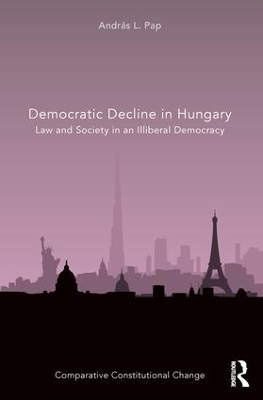
Democratic Decline in Hungary
Routledge (Verlag)
978-1-138-05212-3 (ISBN)
This book shows the rise and morphology of a self-identified `illiberal democracy’, the first 21st century illiberal political regime arising in the European Union. Since 2010, Viktor Orbán’s governments in Hungary have convincingly offered an anti-modernist and anti-cosmopolitan/anti-European Unionist rhetoric, discourse and constitutional identity to challenge neo-liberal democracy. The Hungarian case provides unique observation points for students of transitology, especially those who are interested in states which are to abandon pathways of liberal democracy.
The author demonstrates how illiberalism is present both in `how’ and `what’ is being done: the style, format and procedure of legislation; as well as the substance: the dismantling of institutional rule of law guarantees and the weakening of checks and balances. The book also discusses the ideological commitments and constitutionally framed and cemented value preferences, and a reconstituted and re-conceptualized relationship between the state and its citizens, which is not evidently supported by Hungarians’ value system and life-style choices.
András L. Pap is Research Chair and Head of Department for the Study of Constitutionalism and the Rule of Law, Hungarian Academy of Sciences Centre for Social Sciences, Institute for Legal Studies; he is SASPRO-Marie Skłodowska-Curie Fellow, Institute of Sociology, Slovak Academy of Sciences, Bratislava, Slovakia; Professor of Law, Law Enforcement Faculty, National University of Public Service; Recurrent Visiting (Adjunct) Professor, Nationalism Studies Program, Central European University, Budapest, Hungary.
Introduction
Part I. Chronology and explanations: what happened in Hungary in 2010–2012
Chapter 1. Democratic U-turn, the chronology of building an illiberal democracy
1. Meanwhile in Hungary: An illiberal democracy in the making
2. The legislative juggernaut
3. Dismantling rule of law guarantees
4. Expanding the electorate and gerrymandering
5. And the new constitution…
6. Constitutional partnership or cemented clientelism?
7. Immediate responses
Chapter 2. Causes and explanations
1. Values and political culture
2. Orbán and his strategy: The rhetoric and politics of the "dark side"
3. A little help from the constitutional structure…
4. Economic hardship
Part II. The microfabric of the Hungarian illiberal democracy’
Chapter 3. Illiberalism as constitutional identity
1. Terminology and conceptualization
2. Illiberalism and the emergence of a new political community: The System of National Cooperation
3. Illiberalism and the System of National Cooperation
4. Illiberal democracy as constitutional identity
Chapter 4. Intimate citizenship and value preferences in the new constitution
1. The SNC as a workfare state
2. The SNC as a Christian state
3. Family in the SNC
4. Equality of intimate citizenship in the SNC
5. Reproductive rights in the SNC
5. Paternalism and essentialism in the SNC
6. Conclusions
Chapter 5. Illiberal multiculturalism: deceptive premises, misguided policies
1. Illiberal transnationalism: The nation and the constitution in internal and external homelands
2. Illiberal multiculturalism: The nation and the minorities
3. Conclusion
Chapter 6. Communitarians, dignity, and privacy: personhood and transparency in the System of National Cooperation
1. Communities as primary agents of dignity
2. Liberal instruments for illiberal objectives: privacy as a tool to obstruct public accountability and to protect the dignity of government institutions and officials
3. Privacy as a tool for ethnic discrimination and marginalization
4. Concluding thoughts
Chapter 7. Closing Remarks
Index
| Erscheinungsdatum | 20.09.2017 |
|---|---|
| Reihe/Serie | Comparative Constitutional Change |
| Verlagsort | London |
| Sprache | englisch |
| Maße | 156 x 234 mm |
| Gewicht | 408 g |
| Themenwelt | Naturwissenschaften ► Geowissenschaften ► Geografie / Kartografie |
| Recht / Steuern ► EU / Internationales Recht | |
| Recht / Steuern ► Öffentliches Recht | |
| Sozialwissenschaften ► Politik / Verwaltung ► Politische Systeme | |
| Sozialwissenschaften ► Politik / Verwaltung ► Staat / Verwaltung | |
| ISBN-10 | 1-138-05212-4 / 1138052124 |
| ISBN-13 | 978-1-138-05212-3 / 9781138052123 |
| Zustand | Neuware |
| Haben Sie eine Frage zum Produkt? |
aus dem Bereich


